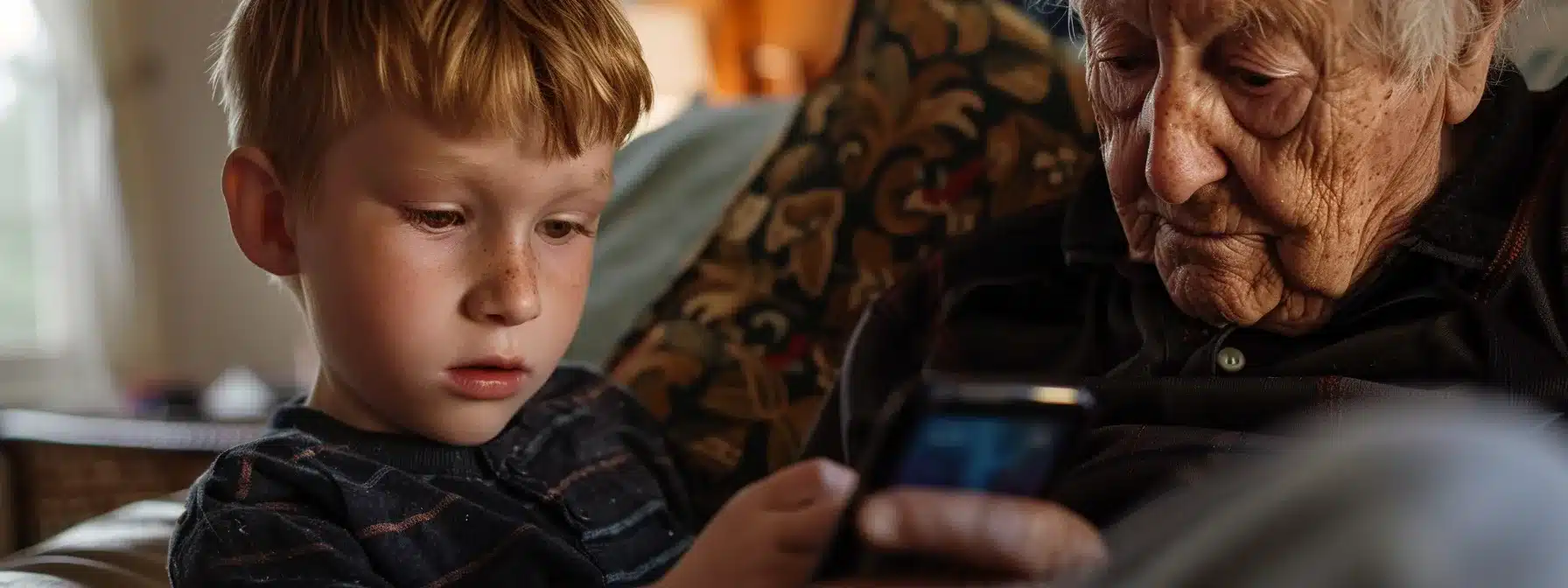Bridging the Gap: Navigating Gramnesia and Generational Family Dynamics
Navigating Gramnesia: Strengthening Family Bonds Across Generations
Have you ever felt a disconnection between your parenting approach and your parents’ expectations as grandparents? This phenomenon, known as “gramnesia when grandparents forget,” affects many families in the digital age. Our article explores the causes of generational disconnects, focusing on how the internet and modern advertising have shaped parenting views, especially during pregnancy. We’ll provide strategies for parents to navigate these challenges and offer tips for building stronger family bonds. By understanding about the latest new term gramnesia, you’ll learn how to bridge the gap and foster better relationships across generations.
Key Takeaways
- Gramnesia causes generational misunderstandings and tensions in families, impacting relationships and child well-being
- Open communication and setting respectful boundaries are crucial for addressing gramnesia and improving family dynamics
- Educating grandparents about modern parenting practices helps bridge generational gaps and foster understanding
- Collaborative decision-making and intergenerational activities strengthen family bonds and mitigate the effects of gramnesia
- Professional mediation or counseling can be valuable for resolving persistent conflicts caused by gramnesia
Understanding Gramnesia: The Hidden Challenge in Families When Grandparents Forget
Grandparents sometimes forget the challenges of raising infants, a phenomenon known as gramnesia, which significantly impacts family dynamics. This section explores the definition and effects of gramnesia on relationships between millennials and their parents, how to identify it in family interactions, and the reasons behind its emergence in modern families. Understanding gramnesia is crucial for bridging generational gaps and fostering empathy within families.
Defining Gramnesia and Its Impact on Generational Relationships
Gramnesia, a term highlited by HuffPost contributor Kelsey Borresen, refers to the phenomenon where older generations forget the challenges of raising infants. This selective memory affects family dynamics, particularly between millennial moms and their parents, as grandparents often underestimate the difficulties of modern parenting. The experience of sleep deprivation, for instance, is often minimized by those who have long since navigated the early years of child-rearing.
The impact of gramnesia on generational relationships can be significant. It can lead to misunderstandings, unrealistic expectations, and a lack of empathy from older family members towards new parents. This disconnect in shared experiences may result in strained relationships, increased stress for new parents, and a breakdown in family support systems. Recognizing and addressing gramnesia is crucial for fostering understanding and maintaining healthy family dynamics across generations.
Recognizing Gramnesia in Family Interactions
Recognizing gramnesia in family interactions requires attentiveness and empathy. In the United States, where generational gaps can be pronounced, identifying this phenomenon often involves noticing dismissive or minimizing comments from older relatives about the challenges of modern parenting young kids. These interactions may manifest as grandparents downplaying the difficulties of sleep deprivation or suggesting that parenting was easier in their day.
To address gramnesia effectively, open and honest conversation between generations is crucial. When frustration arises due to perceived lack of understanding, it’s essential to approach the topic with patience and clarity. Educating older family members about the unique challenges faced by today’s parents can help bridge the generational divide and foster a more supportive family environment.
- Listen for dismissive comments about parenting challenges
- Notice comparisons to “easier” past parenting experiences
- Observe minimization of current parenting difficulties
- Pay attention to unrealistic expectations for new parents
Why Gramnesia Emerges in Modern Family Dynamics
psychological factors. As time passes, older generations may unconsciously romanticize their past parenting experiences, creating a distorted perception of the challenges they faced. Parents today often share their own experiences regarding the challenges of parenting, particularly when facing judgment or nostalgic remarks from grandparents. This phenomenon can be seen in the area served by the Therapy Group of DC (Washington, DC, Maryland, and Virginia) and other areas where rapid societal changes have widened the gap between generational parenting experiences.
Another reason for gramnesia’s prevalence is the evolving nature of parenting responsibilities and societal expectations. Modern parents often juggle work, child-rearing, caring for aging parents, and personal pursuits, leading to challenges that may not have been as pronounced in previous generations. This shift in lifestyle, combined with the constant feeling of being overwhelmed, can create a disconnect between older and younger family members, especially when discussing topics like balancing childcare with activities such as shopping or career advancement.
Causes of Generational Disconnects Between Parents and Grandparents
Generational disconnects between new parents and their own parents stem from various factors. Differing parenting philosophies across generations often lead to conflicting approaches. Societal changes have significantly altered family roles and expectations. Additionally, technological gaps create communication barriers, further widening the generational divide. Understanding these causes is crucial for fostering better relationships and navigating family dynamics effectively.
Differing Parenting Philosophies Across Generations
Parenting philosophies have evolved significantly over generations, leading to differing approaches between boomer parents and grandparents. Modern parents often prioritize child-led learning, emotional intelligence, and open communication, while older generations may emphasize discipline, structure, and traditional values. These contrasting viewpoints can create tension and misunderstanding within families, particularly when discussing child-rearing practices.
The shift in parenting styles reflects broader societal changes, including advances in child psychology and increased emphasis on individual expression. Grandparents may struggle to understand or accept these new approaches, leading to conflicts over discipline, education, and technology use. Bridging this philosophical gap requires open dialogue and mutual respect, allowing both generations to learn from each other’s perspectives and experiences.
The Influence of Societal Changes on Family Roles
Societal changes have significantly altered family roles, contributing to generational disconnects between parents and grandparents. The shift towards dual-income households has redefined parenting responsibilities, with both parents often sharing childcare duties. This contrasts with traditional family structures where mothers typically assumed primary caregiving roles, leading to differing expectations and potential conflicts between generations.
The increasing acceptance of diverse family structures, including single-parent households and same-sex partnerships, has further transformed family dynamics. Grandparents may struggle to adapt to these evolving norms, particularly if they clash with their traditional views. This disconnect can manifest in misunderstandings about parenting choices and family values, necessitating open communication and mutual respect to bridge the generational gap.
Technological Gaps Creating Communication Barriers for Millennial Parents
Technological gaps between generations create significant communication barriers within families. Older generations often struggle to adapt to rapidly evolving digital platforms, leading to misunderstandings and decreased interaction with younger family members. This disconnect can result in grandparents feeling excluded from important family updates and events shared primarily through social media or messaging apps. Loneliness and social isolation risk factors and how to overcome them are significant in understanding this issue further.
The prevalence of smartphones and digital communication tools has fundamentally altered how families interact. While younger generations rely heavily on text messages, video calls, and social media for daily communication, older family members may prefer traditional phone calls or face-to-face interactions. This divergence in communication preferences can lead to decreased frequency and quality of intergenerational exchanges, further widening the generational gap. To bridge this divide, families must actively work to accommodate various communication styles and teach digital literacy skills across generations:
- Encourage regular family tech-training sessions
- Establish multi-generational family group chats
- Plan both digital and in-person family gatherings
- Share important updates through multiple communication channels
The Effects of Gramnesia on Family Relationships
Young parents are significantly impacted by gramnesia, leading to misunderstandings and tensions between generations. This section examines how these conflicts affect children emotionally and explores the long-term consequences on family unity. Understanding these effects is crucial for addressing generational disconnects and fostering healthier family dynamics.
Misunderstandings Leading to Family Tensions
Gramnesia often leads to misunderstandings between generations, creating tension within families. Grandparents may unintentionally dismiss the challenges faced by new parents, so the grandparents often make dismissive comments about the difficulties of raising young children, leading to feelings of frustration and isolation. These misunderstandings can escalate, causing rifts in family relationships and hindering effective communication.
The tension arising from gramnesia-induced misunderstandings can manifest in various ways. Parents may feel unsupported or judged, while grandparents might perceive their advice as disregarded. This disconnect can result in reduced family interactions, decreased emotional support, and missed opportunities for intergenerational bonding, ultimately impacting the overall family dynamic.
Emotional Impact on Young Kids Observing Family Conflicts
Children observing conflicts resulting from gramnesia often experience emotional distress and confusion, especially when comparing these conflicts to the experiences of their parents with their own children. These intergenerational disagreements can create a sense of divided loyalty, as children struggle to navigate the differing expectations and attitudes of their parents and grandparents. The tension in the family environment may lead to increased anxiety and stress in children, potentially affecting their emotional well-being and social development. For more information on how these experiences can impact mental health, consider reading why is mental health important.
The impact of gramnesia-related conflicts on children extends beyond immediate emotional reactions. Prolonged exposure to family discord can shape a child’s understanding of relationships and conflict resolution. Children may internalize unhealthy communication patterns or develop a skewed perception of intergenerational dynamics, potentially influencing their future relationships and parenting styles. Addressing these issues through open communication and family therapy can help mitigate the long-term effects on children’s emotional health.
Long-Term Consequences on Family Unity
The long-term consequences of gramnesia on family unity can be significant and far-reaching. Persistent misunderstandings and unresolved conflicts may lead to emotional distance between family members, potentially resulting in reduced contact and weakened relationships over time. This erosion of family bonds can deprive children of valuable intergenerational connections and support systems, impacting their sense of family identity and belonging.
Addressing gramnesia and its effects is crucial for maintaining family cohesion. Families that successfully navigate these challenges often emerge stronger, with improved communication skills and a deeper appreciation for diverse perspectives. Proactive steps to bridge generational gaps can foster resilience and create a more harmonious family dynamic, benefiting all members across generations. These efforts may include:
- Regular family meetings to discuss and resolve issues
- Intergenerational activities that promote shared experiences
- Open dialogue about parenting challenges and expectations
- Seeking professional family counseling when needed
Strategies for Parents to Navigate Gramnesia Successfully
Navigating gramnesia requires effective strategies for parents to help grandparents express emotions and understand the challenges of modern parenting. This section explores approaches to address generational disconnects, including initiating open conversations with grandparents, setting clear boundaries respectfully, educating about contemporary parenting practices, and finding common ground through shared goals. These strategies aim to foster understanding and strengthen family relationships across generations.
Initiating Open Conversations With Grandparents
Initiating open conversations with grandparents is a crucial step in addressing gramnesia and bridging generational gaps. Parents can start by choosing a calm, neutral setting to discuss their parenting challenges and experiences, perhaps sharing how their own mother or grandparents have made comments that feel dismissive. This approach allows for a more relaxed atmosphere, encouraging honest and empathetic dialogue between generations.
During these conversations, parents should focus on sharing specific examples of their daily parenting struggles, such as managing work-life balance or addressing modern childhood issues. By providing concrete illustrations, parents can help grandparents better understand the unique challenges of contemporary parenting. This open communication fosters mutual understanding and can lead to more supportive family relationships. To facilitate productive discussions, parents can:
- Schedule regular family meetings to discuss parenting topics
- Use “I” statements to express feelings and experiences
- Invite grandparents to share their own parenting memories
- Acknowledge and appreciate generational differences in parenting approaches
Setting Clear Boundaries Respectfully
Setting clear boundaries respectfully is crucial for parents navigating gramnesia. Parents can establish guidelines for grandparental involvement in child-rearing decisions, ensuring their parenting choices are respected while maintaining positive family relationships. This approach helps prevent misunderstandings and reduces potential conflicts arising from differing parenting philosophies.
Effective boundary-setting involves clear communication and consistent enforcement. Parents should express their expectations calmly and directly, explaining the reasons behind their boundaries. By involving grandparents in discussions about these limits, parents can foster understanding and cooperation, leading to a more harmonious family dynamic that respects both generations’ perspectives.
Educating About Contemporary Parenting Practices
Educating grandparents about contemporary parenting practices is essential for bridging the generational gap caused by gramnesia. Parents can share evidence-based information on modern child-rearing methods, explaining the rationale behind approaches such as positive discipline, responsive feeding, and screen time management. This knowledge-sharing helps grandparents understand the science-backed reasons for current parenting strategies.
To facilitate this education process, parents can utilize various resources and methods. They might invite grandparents to parenting workshops, share relevant articles or books, or encourage them to attend pediatrician appointments. This collaborative learning approach fosters understanding and helps align family members’ expectations regarding child care. Key areas to focus on include:
- Sleep training techniques and their importance for infant development
- Nutritional guidelines for different stages of childhood
- The role of technology in modern education and socialization
- Current safety standards and recommendations for childcare products
Finding Common Ground Through Shared Goals
Finding common ground through shared goals offers a powerful strategy for parents to navigate gramnesia and improve family relationships. By focusing on mutual objectives, such as the child’s well-being and happiness, parents and grandparents can bridge generational gaps and foster a collaborative approach to caregiving. This alignment of purpose helps reduce conflicts arising from differing parenting styles and creates a more supportive family environment.
Parents can initiate this process by identifying areas where grandparents’ involvement aligns with their parenting goals. For example, they might involve grandparents in teaching family traditions or sharing cultural heritage, activities that benefit the child while respecting the wisdom of older generations. This approach strengthens family bonds and helps grandparents feel valued and included in the child’s upbringing, mitigating the effects of gramnesia.
Encouraging Mutual Understanding Across Generations
Encouraging mutual understanding across generations is essential for addressing gramnesia and improving family dynamics. This section explores active listening techniques for better communication, empathy exercises to appreciate different perspectives, and collaborative decision-making in family matters. These strategies aim to bridge generational gaps and foster stronger family relationships.
Active Listening Techniques for Better Communication
Active listening techniques play a crucial role in improving communication between generations affected by gramnesia. These techniques involve fully concentrating on the speaker, understanding their message, and responding thoughtfully. Family members can bridge generational gaps and foster mutual understanding by employing active listening.
To practice active listening effectively, individuals should focus on several key strategies. These include maintaining eye contact, avoiding interruptions, and paraphrasing the speaker’s message to ensure comprehension. Additionally, asking clarifying questions and providing nonverbal cues of engagement can significantly enhance the quality of intergenerational communication:
- Maintain eye contact and open body language
- Avoid interrupting or formulating responses while others speak
- Paraphrase and summarize to confirm understanding
- Ask thoughtful questions to encourage elaboration
- Provide verbal and nonverbal cues of active engagement
Empathy Exercises to Appreciate Different Perspectives of Older Generations
Empathy exercises prove invaluable in fostering understanding between generations affected by gramnesia. These activities encourage family members to step into each other’s shoes, promoting a deeper appreciation of differing perspectives. Parents and grandparents can gain insight into the challenges and experiences unique to each generation by engaging in role-playing scenarios or guided discussions.
One effective empathy exercise involves family members sharing personal stories from their parenting journeys. This exchange allows participants to identify common experiences and challenges across generations, bridging the gap created by gramnesia. To enhance the effectiveness of these exercises, families can follow these steps:
- Create a safe, judgment-free environment for sharing
- Encourage active listening during story exchanges
- Reflect on similarities and differences in experiences
- Discuss how societal changes have impacted parenting
- Collaboratively brainstorm ways to support each other
Collaborative Decision-Making in Family Matters
Collaborative decision-making in family matters is a powerful tool for bridging generational gaps and addressing gramnesia. Families can foster a sense of unity and shared responsibility by involving both parents and grandparents in important family decisions. This approach encourages open communication and helps all generations feel valued and heard.
To implement collaborative decision-making effectively, families can establish regular family meetings or create a structured process for discussing important issues. This method allows for considering diverse perspectives and experiences, leading to more balanced and well-informed choices. Key steps in collaborative family decision-making include:
- Clearly defining the issue or decision at hand
- Encouraging input from all family members
- Weighing pros and cons of different options together
- Seeking consensus or compromise when possible
- Establishing a plan for implementing the decision
Building Stronger Family Bonds Amidst Gramnesia
Building stronger family bonds amidst gramnesia requires proactive strategies. This section explores creating intergenerational activities to bridge gaps, celebrating family traditions and values together, and seeking mediation or counseling when needed. These approaches aim to foster understanding, strengthen relationships, and address generational disconnects effectively, promoting a more harmonious family dynamic.
Creating Intergenerational Activities to Bridge Gaps
Intergenerational activities are crucial in bridging the gaps created by gramnesia within families. These shared experiences provide opportunities for grandparents, parents, and children to connect on a deeper level, fostering understanding and empathy across generations. Families can create lasting memories and strengthen their bonds by engaging in activities that appeal to all age groups.
Effective intergenerational activities might include cooking traditional family recipes together, participating in outdoor adventures, or collaborating on community service projects. These shared experiences allow family members to learn from one another, appreciate different perspectives, and develop a sense of mutual respect. By regularly incorporating such activities into family life, the impact of gramnesia can be significantly reduced, leading to more harmonious and supportive family relationships.
Celebrating Family Traditions and Values Together
Celebrating family traditions and values together is a powerful antidote to gramnesia, fostering a sense of continuity and shared identity across generations. By engaging in rituals and customs passed down through the years, families create opportunities for grandparents to share their wisdom and experiences, while allowing younger generations to contribute new interpretations and perspectives. This collaborative approach to honoring family heritage helps bridge generational gaps and reinforces the importance of collective memory.
Regular family gatherings centered around traditional celebrations provide a platform for open dialogue and mutual understanding. These events allow family members to discuss the significance of various customs, explore their origins, and adapt them to contemporary contexts. By actively involving all generations in the planning and execution of these celebrations, families can create a sense of shared ownership and responsibility, further strengthening intergenerational bonds and mitigating the effects of gramnesia.
Seeking Counseling When Needed
When family conflicts from gramnesia persist, seeking professional counseling can be a valuable step toward resolution. A neutral third party can help facilitate productive conversations, providing tools and strategies to address underlying issues and improve communication between generations. Professional intervention often helps families identify and overcome barriers to understanding, leading to more harmonious relationships.
Family therapists specializing in intergenerational dynamics can offer tailored approaches to address gramnesia-related challenges. These professionals can guide families through exercises designed to enhance empathy, teach effective communication techniques, and develop coping strategies for managing disagreements. By engaging in counseling together, family members demonstrate their commitment to strengthening bonds and fostering mutual respect across generations.
Conclusion
Navigating gramnesia and generational family dynamics is crucial for fostering healthy relationships and promoting understanding across generations. By addressing misunderstandings, implementing effective communication strategies, and creating shared experiences, families can bridge the gaps caused by differing parenting perspectives and societal changes. Embracing empathy, setting respectful boundaries, and celebrating family traditions together contribute to stronger family bonds and improve intergenerational relationships. Ultimately, recognizing and addressing gramnesia is essential for creating a supportive family environment that values the experiences and wisdom of all generations while adapting to the unique challenges of modern parenting.
If navigating generational challenges in your family feels overwhelming, individual support can help you manage the stress and improve communication with loved ones. The Therapy Group of DC offers personalized counseling to help you develop strategies for navigating family dynamics and enhancing your well-being. Reach out to us today to learn how we can help you build healthier relationships.
Frequently Asked Questions
What is gramnesia and how does it affect family relationships?
Gramnesia is a term describing the tendency to forget grammar rules in everyday communication. It can strain family relationships by causing misunderstandings, frustration, and miscommunication. For example, grandparents might claim they had their children potty trained before the age of one, highlighting a generational disconnect and the challenges modern parents face when navigating these assumptions from their parents. Family members may struggle to express themselves clearly or interpret others’ messages accurately, potentially leading to conflicts and reduced emotional connection.
How can parents effectively navigate generational disconnects with grandparents?
Parents can bridge generational gaps with grandparents by fostering open communication, setting clear boundaries, and promoting mutual respect. Encouraging shared activities and educating both generations about changing societal norms can help create understanding. Patience and flexibility are key to maintaining positive family relationships across generations.
What strategies help improve understanding between different generations in a family?
Improving intergenerational understanding in families requires open communication, active listening, and mutual respect. Sharing experiences, practicing empathy, and finding common ground can bridge generational gaps. Regular family activities and open discussions about different perspectives foster connection and appreciation for diverse viewpoints across generations.
How does gramnesia impact the bond between grandparents and grandchildren?
Gramnesia, or memory loss in grandparents, can strain relationships with grandchildren by impacting shared experiences and emotional connections. It may lead to confusion, frustration, and a sense of loss for both parties, potentially altering the dynamics of their bond and requiring adaptation in communication and interaction.
What are common causes of generational disconnects in families?
Generational disconnects in families often stem from differing values, communication styles, and life experiences. Technological advancements, changing societal norms, and evolving cultural expectations can create gaps in understanding between generations, leading to misunderstandings and conflicts within family units.






